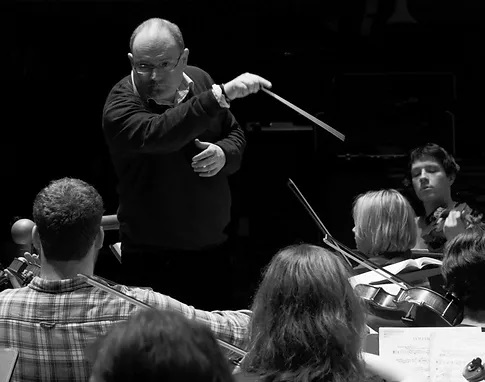
Martin Roscoe: Stepped in as late replacement. “The orchestra was fortunate to secure him”
YORK Guildhall Orchestra observed two anniversaries at this entertaining Sunday matinee conducted by Simon Wright.
Shostakovich died a century after Ravel was born, in 1975 (he had visited York three years earlier). So 2025 conveniently marks both the sesquicentenary of the former’s birth and 50 years since the latter’s death. Before we heard from them, there were bonbons from Kabalevsky and Khachaturian. It was good family fare, with a sizeable audience to match.
The centrepiece was Shostakovich’s Second Piano Concerto, Op 102 in F, which dates from 1957. The composer was beginning his operetta Moscow, Cheryomushki at the same time and the concerto is in similarly light-hearted vein. That was certainly the line taken by Martin Roscoe, the doughty soloist; he had stepped in as replacement: the orchestra was fortunate to secure him.
Gone from the first movement are the grandiose gestures that other Russians, say Tchaikovsky or Rakhmaninov, might have given us. Roscoe penetrated its sense of humour immediately. He took its light, capricious textures in his stride, sustaining a sparkling staccato.
There was a lovely restraint just before the piano’s thunderous quadruple octaves, after which the orchestra briefly drowned him. But his accelerating cadenza made ample amends.
The introspective slow movement, almost a single line melody in the piano, was profoundly elegiac here and all the more effective for its simplicity. Almost as telling as the piano’s aggressive dance in the finale was the way Wright kept the pizzicato strings in such close attendance. It added brio to the excitement and seemed to inspire Roscoe through his virtuoso passages.
The overture to the first of Kabalevsky’s five operas, Colas Breugnon – he also wrote an operetta –was notable for the slickness in the orchestra’s handling of its syncopation. Listeners of an older generation will recall the Adagio from Khachaturian’s ballet Spartacus as the signature tune of that rollicking sea series, The Onedin Line.
More aptly, perhaps, it was heard here the day before the ballet’s great choreographer Yuri Gregorovich died, at the age of 98. Wright built up the sweeping theme to a juicy climax.
After the interval it was all Ravel. The reduced orchestra gave a tender account of the Pavane Pour Une Infante Défunte. His colourful orchestration in the second Daphnis et Chloé suite – where we had one player, David Hammond, unusually doubling on double bass and celesta – was fully demonstrated by the huge percussion section.
The opening heat-haze was delicately drawn and the closing Bacchanale properly rumbustious. Ravel threw the kitchen sink at it – all we lacked here was the (optional) wordless chorus.
Bolero conjured Torvill & Dean – and much more. It calls for three saxophones, but Rachel Green played all those roles single-handed. Such is the versatility of this orchestra. These afternoon sessions are proving ever more successful, judging by the growing audiences, and the players are clearly revelling in it.
Review by Martin Dreyer

